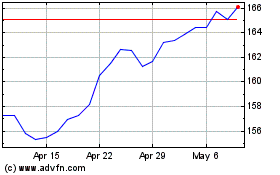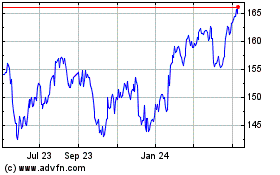SLOUGH, England—The gates guarding Reckitt Benckiser Group PLC's
headquarters were plastered with pictures of dying and injured
babies on Wednesday. Inside, a South Korean firefighter whose
5-year-old son had died waited to meet with Reckitt's chief
executive.
Dukjong Kim's son was one of more than 100 people, mainly
pregnant women and infants, known to have been killed in South
Korea by Reckitt's humidifier disinfectant Oxy Sac Sac. Mr. Kim
stood alongside lawmakers and representatives of other victims, all
of whom had flown in from Seoul to demand an apology from CEO
Rakesh Kapoor.
"I sincerely apologize for the injury and deaths of Korean
consumers" caused by Reckitt's disinfectant, Mr. Kapoor said in a
statement Wednesday. He offered his "deepest sympathy" for "the
pain and the irreparable damage suffered by many families."
Reckitt's problems began to surface five years ago, with the
unexplained deaths of four pregnant women in South Korea who had
used humidifiers. The products are widely used there due to the
country's dry winters. Sac Sac—which Reckitt got with its 2001
acquisition of a Korean company—wasn't sold outside of South
Korea.
In late 2011, the Korea Centers for Disease Control and
Prevention released the results of a study: Animal inhalation tests
showed a causal link between humidifier disinfectants and a growing
number of lung injuries. The agency ordered a recall of the
disinfectants.
The Korean government so far has confirmed 189 deaths and 506
injuries from humidifier disinfectants, connected to Reckitt as
well as other companies.
While South Korea made up just 1.5% of Reckitt's sales last
year, the impact of the humidifier disinfectant deaths has been
outsized. Reckitt in July reported a 19% drop in first-half profit
amid a £ 300 million ($389.7 million) charge in compensation for
those killed or injured by the disinfectant, a rare bump for the
otherwise high-performing company.
Reckitt warned that annual sales would be at the lower end of
its previously given range and that more charges could follow.
In South Korea, leading retailers have removed all products of
Reckitt, which owns such brands as Durex condoms and Dettol hand
wash, from their shelves in the wake of burgeoning anger around the
disinfectant deaths.
"Practically we have nothing selling in South Korea," Mr. Kapoor
said in a July meeting with reporters in London.
The backlash comes as South Korea cracks down on foreign
companies including Volkswagen AG and Novartis AG amid mounting
public anger over a government perceived as prioritizing big
business over people. The humidifier-disinfectant deaths in
particular have had far-reaching impacts, inciting calls for new
U.S.-style laws or punitive damages that would slap companies with
huge fines.
In an unusual move, Procter & Gamble Co. opened its
Cincinnati research center to more than 40 Korean journalists in
July. South Korea is P&G's third-largest air-care market, and
the company reacted after seeing "concern over a variety of
air-freshener and air-care products" that was "sparked by the
Reckitt case," a P&G spokeswoman said.
Reckitt recalled its disinfectant products in 2011 but
commissioned Seoul National University, Hoseo University and Korea
Conformity Laboratories to test its humidifier disinfectant, and
privately hired two researchers from the universities as
consultants. The Korean prosecutors' office alleges Reckitt
rejected test results showing its products were unsafe, bribed the
two researchers to manufacture favorable results and ignored
toxicity warnings about its product from a German expert in
2000.
"Our review so far indicates that our people followed an
approach to the testing which they believed was lawful," a Reckitt
spokeswoman said. "We do not believe that any of our employees
intended to influence improperly the outcomes of the testing."
Prosecutors have since highlighted the role of the Korean
company that made polyhexamethylene guanidine phosphate, or PHMG,
the ingredient found to be toxic. Other Korean companies making
disinfectants also have come under fire.
But Reckitt—which dominated about 47% of the
humidifier-disinfectant market and 70% of the market for ones that
used PHMG—has borne the brunt of the public's anger. The company
didn't run safety tests on Sac Sac despite labeling it in 2003 as
"safe for children" and said its manufacturers didn't test the
product either. A Reckitt spokeswoman said verifying safety
information, which regulators didn't require, "was not part of RB's
standard operating procedure."
The mounting outrage, which comes after prosecutors in January
beefed up the team investigating the deaths, has forced the company
to make an abrupt about-face from its yearslong strategy of
interacting with victims solely through a court-approved mediation
process.
"We followed a legally led strategy," Mr. Kapoor said in July.
"We started on a path which was inadequate, which was slow, which
did not reach the right level of response, and I think what we have
said is we need to try a completely different solution."
Reckitt in May hired crisis-communications firm FleishmanHillard
Fishburn to help it tackle the issue. It has put £ 6 million ($7.8
million) into a humanitarian fund and has earmarked up to 1 billion
Korean won, or about $895,000, for a victim's death or severe
disability. The company in July established a board committee aimed
at monitoring ethics, compliance and corporate social
responsibility and says it plans to upgrade its safety and
quality-management systems.
Critics say the compensation isn't enough and that the company's
apologies, coming five years after its products were tagged as
toxic, ring hollow.
Reckitt has "deceived customers and disrespected life for more
than 15 years," read a flier pasted to the company's gates. The
flier was signed "Victims' mom and dad."
Min Sun Lee and Alastair Gale in Seoul contributed to this
article.
Write to Saabira Chaudhuri at saabira.chaudhuri@wsj.com
(END) Dow Jones Newswires
September 21, 2016 14:25 ET (18:25 GMT)
Copyright (c) 2016 Dow Jones & Company, Inc.
Procter and Gamble (NYSE:PG)
Historical Stock Chart
From Mar 2024 to Apr 2024

Procter and Gamble (NYSE:PG)
Historical Stock Chart
From Apr 2023 to Apr 2024
